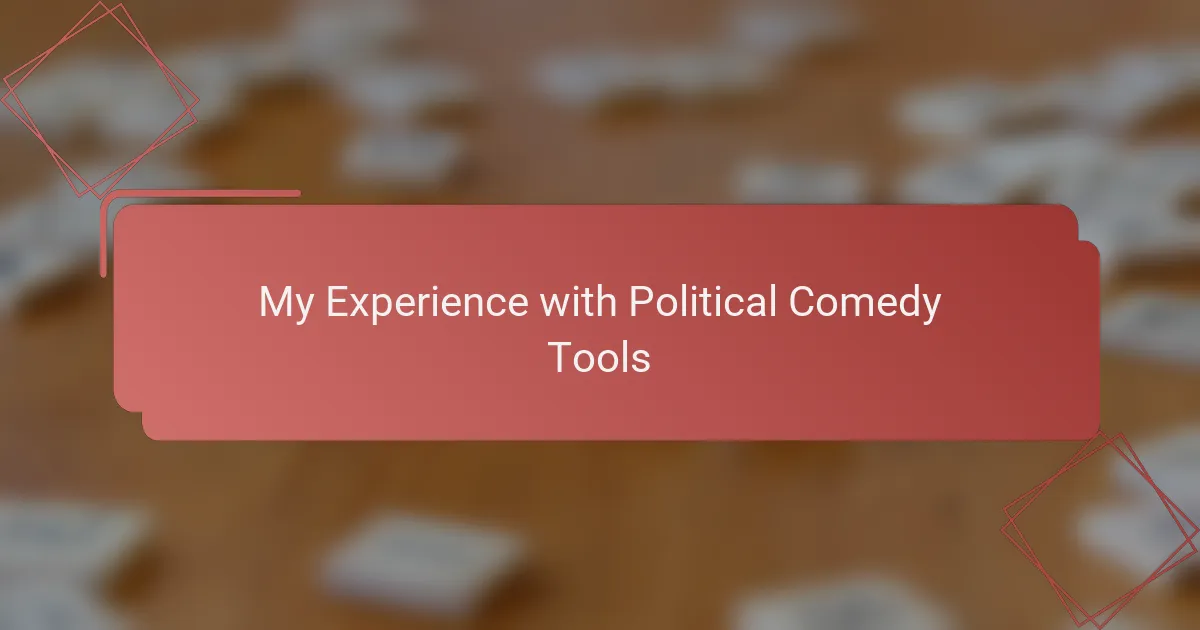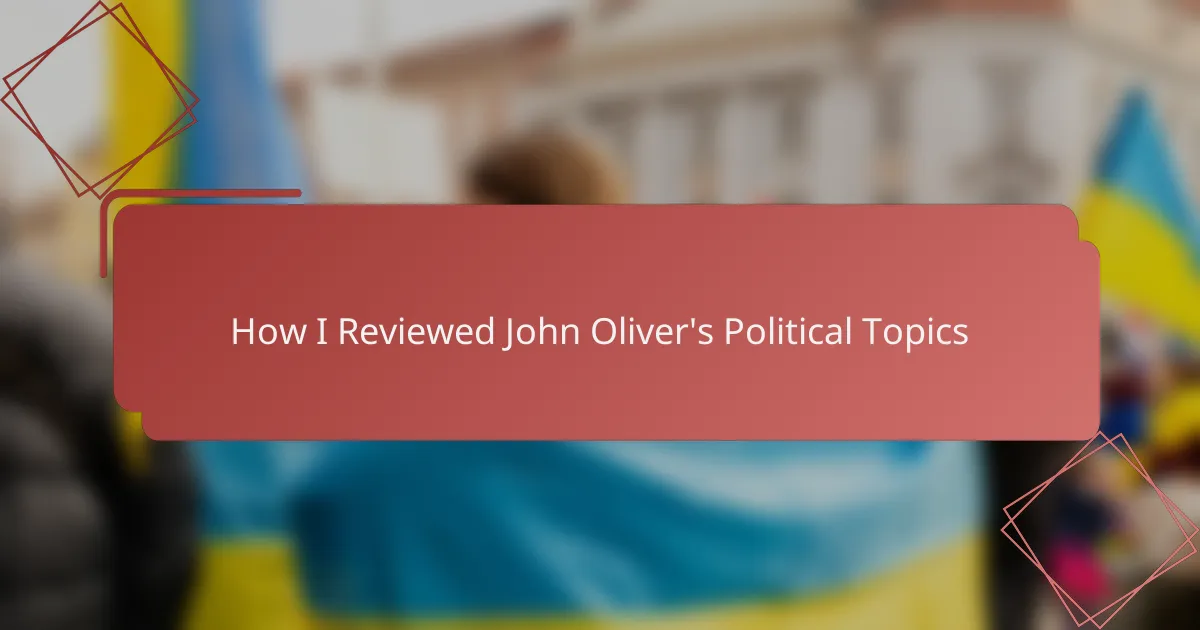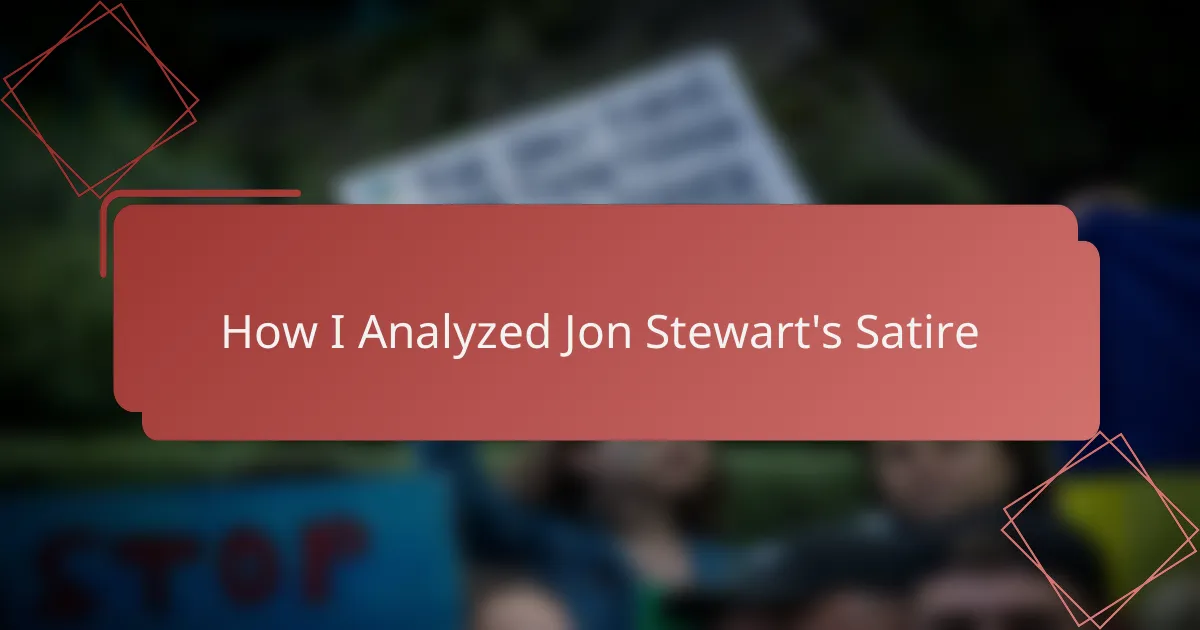Key takeaways
- Political comedy serves as a tool for critique, using humor to challenge societal views and political power.
- Common techniques in political satire include exaggeration, irony, sarcasm, parody, and wordplay, each revealing contradictions and encouraging reflection.
- Integrating political comedy into conversations can create a more relaxed atmosphere, promoting meaningful dialogue while requiring sensitivity to the audience’s perspectives.
- Effective political satire not only entertains but also resonates emotionally, often prompting audiences to reconsider their beliefs and engage in critical thinking.
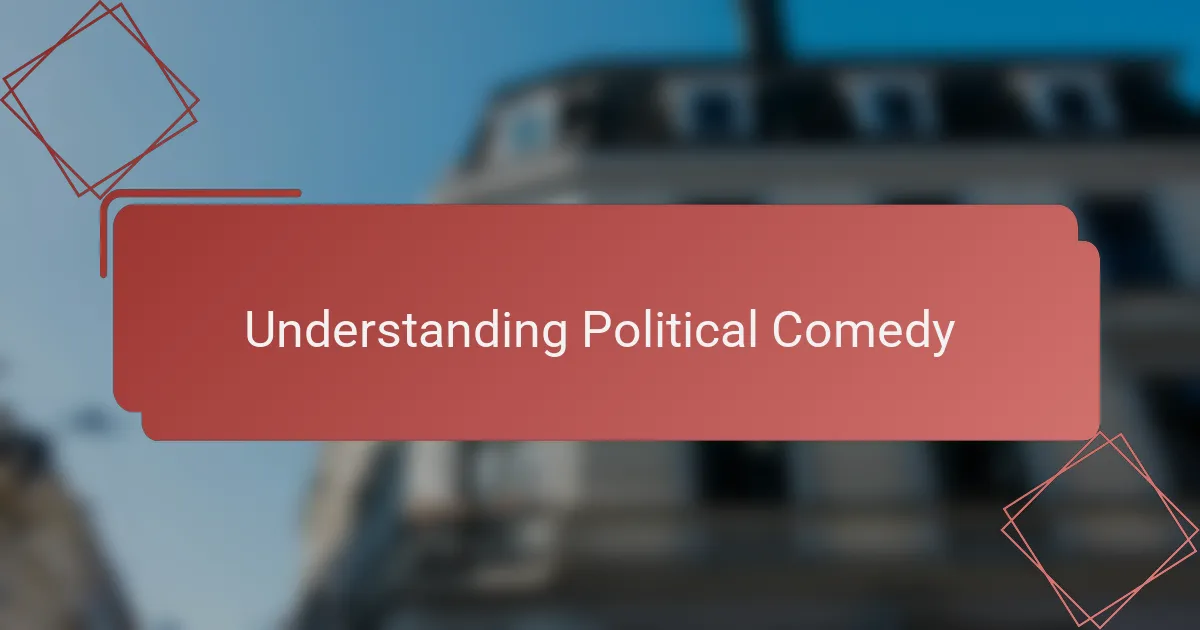
Understanding Political Comedy
Political comedy has always struck me as a fascinating blend of humor and critique. It’s not just about making people laugh; it’s about holding a mirror up to society and prompting us to question power. Have you ever caught yourself chuckling nervously at a joke that made you rethink your own views? That’s the power political comedy holds.
From my experience, the beauty of political comedy lies in its ability to address serious issues through satire, sarcasm, and irony. These tools act like a sharp scalpel, cutting through the layers of political rhetoric to reveal uncomfortable truths. I remember watching a comedian who used biting sarcasm to highlight corruption, and it left me both amused and deeply reflective.
What makes political comedy truly effective, in my opinion, is its skillful balancing act. It walks the fine line between offense and insight, pushing boundaries without alienating its audience. This delicate dance challenges us to engage with politics in a way that’s both accessible and thought-provoking—something I continually find both refreshing and necessary.
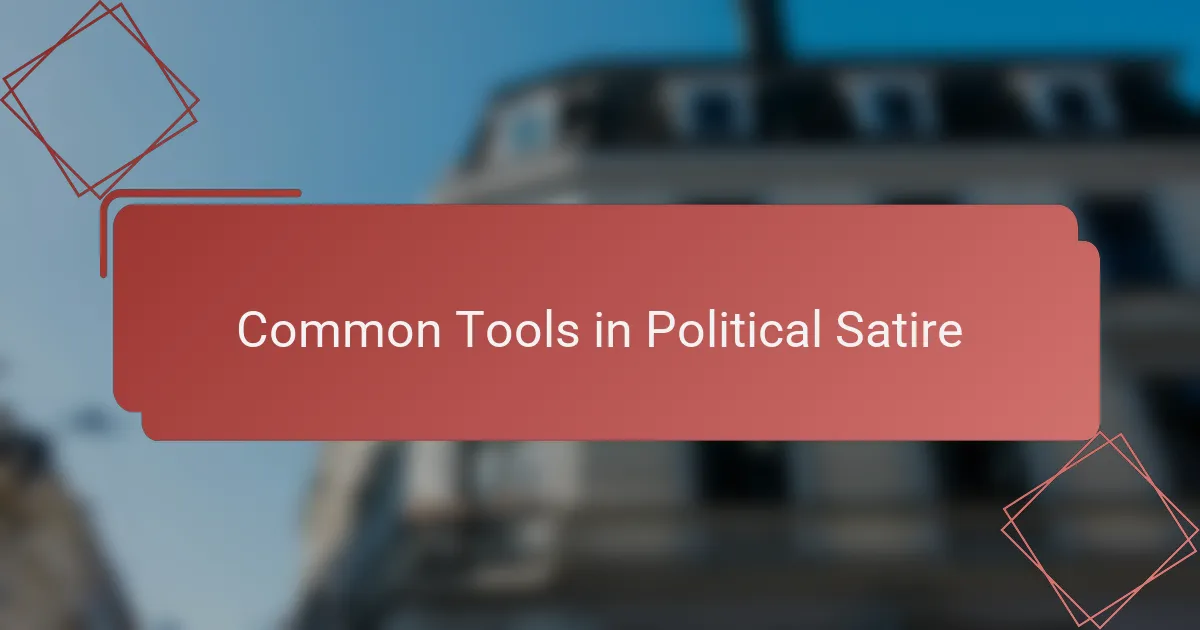
Common Tools in Political Satire
When I think about the common tools in political satire, exaggeration immediately comes to mind. It’s fascinating how taking a politician’s traits or policies and blowing them out of proportion can highlight absurdities that might otherwise go unnoticed. Have you ever laughed at a caricature so much that you suddenly saw the real person in a completely new light? That’s the kind of insight exaggeration can deliver.
Another tool I often notice is irony, which feels like a personal favorite. The way it flips expectations on their heads, exposing contradictions in political statements or actions, always strikes me as clever and sharp. I recall a sketch that portrayed a politician campaigning for transparency—but behind the scenes, everything was opaque. That contrast? Pure irony at work, making me question the real intentions behind political words.
Then there’s sarcasm, which can sometimes feel like walking a tightrope. From my perspective, it’s powerful because it combines humor with a sting, making a point while entertaining. But I’ve seen it backfire when it’s too harsh, alienating people instead of engaging them. Have you ever felt conflicted laughing at a sarcastic joke because it hit too close to home? That personal tension is what makes sarcasm such a dynamic but delicate tool in political satire.
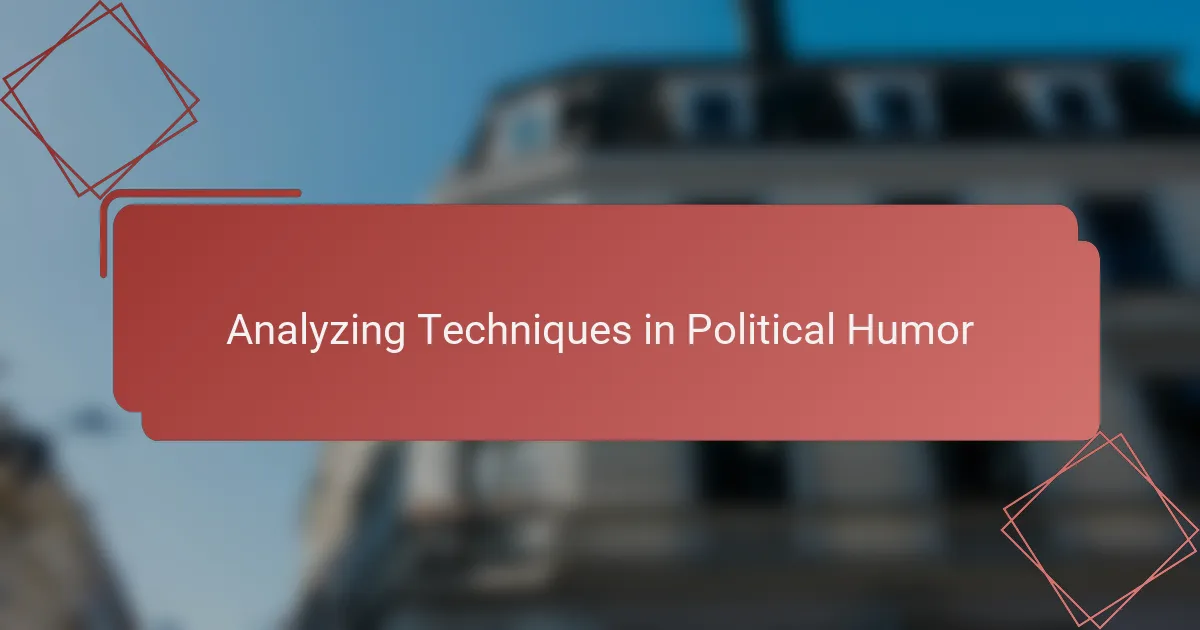
Analyzing Techniques in Political Humor
Analyzing techniques in political humor often reveals a fascinating interplay between subtlety and boldness. From my experience, one effective method is juxtaposition—placing opposing ideas side by side to expose contradictions. For example, I once saw a skit contrasting a politician’s lofty campaign promises with their questionable past actions, and that stark contrast not only sparked laughter but also a deeper reflection on political accountability.
Another technique I find compelling is the use of parody, which mimics political figures or events exaggerated to the point of absurdity. This approach, in my opinion, does more than entertain; it demystifies the aura of authority around politicians. I remember watching a parody where a leader was depicted as a clueless character making decisions based on whims, and it made me question how much competence we expect from those in power.
Then there’s wordplay, which often flies under the radar but packs a punch when done right. Puns, double entendres, or clever twists on political jargon can make complex issues more approachable. Have you ever caught a witty headline or a sharp one-liner that instantly changed the way you thought about a policy? That’s wordplay working its magic—engaging the mind while tickling the funny bone.
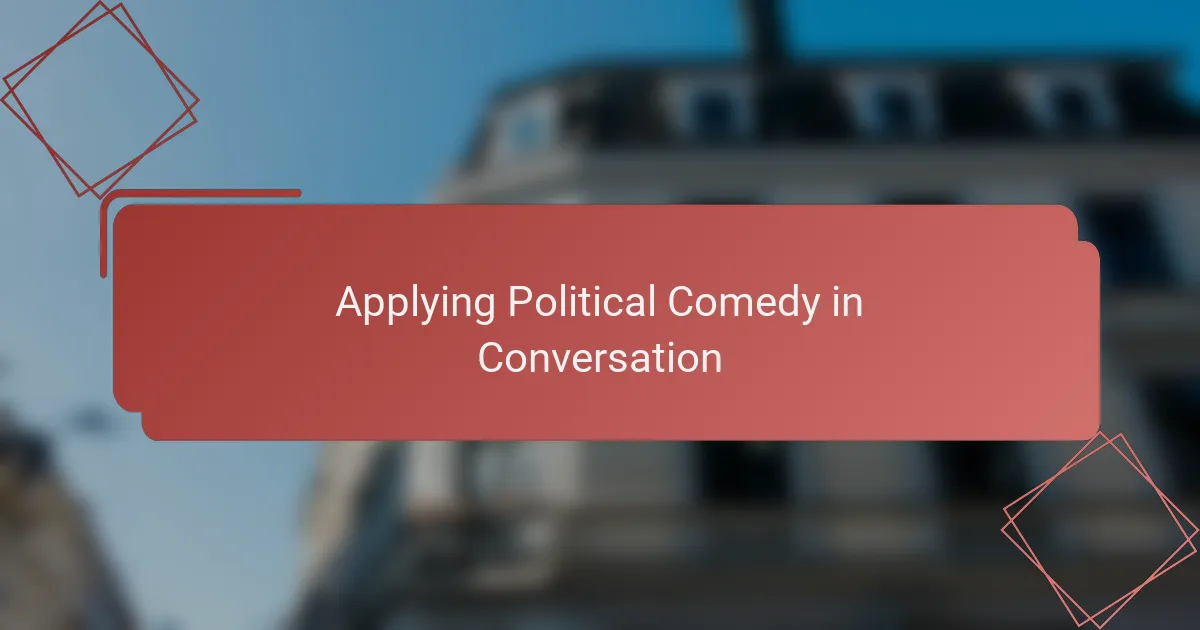
Applying Political Comedy in Conversation
When I bring political comedy into everyday conversations, I find it can lighten tense discussions and open doors to deeper reflection. Have you ever noticed how a well-timed joke about a politician’s blunder can diffuse frustration and invite others to see the absurdity beneath serious issues? That shift from defensiveness to laughter creates common ground where meaningful dialogue can happen.
Of course, applying political comedy in conversation requires a certain sensitivity. From my experience, gauging your audience’s mood and political leanings before slipping in satire is crucial. I once shared a sarcastic quip about a policy with a group who didn’t appreciate the humor, and it quickly shut down the conversation—teaching me that timing and context are everything when using comedy as a tool.
I also love how political comedy can serve as a subtle nudge, prompting people to question the status quo without feeling attacked. It’s like slipping a spoonful of medicine into conversation; the humor makes the critique easier to swallow. Have you ever caught yourself laughing at a joke that suddenly made you reconsider your stance? That moment of surprise, sparked by comedy, is where real change can begin.
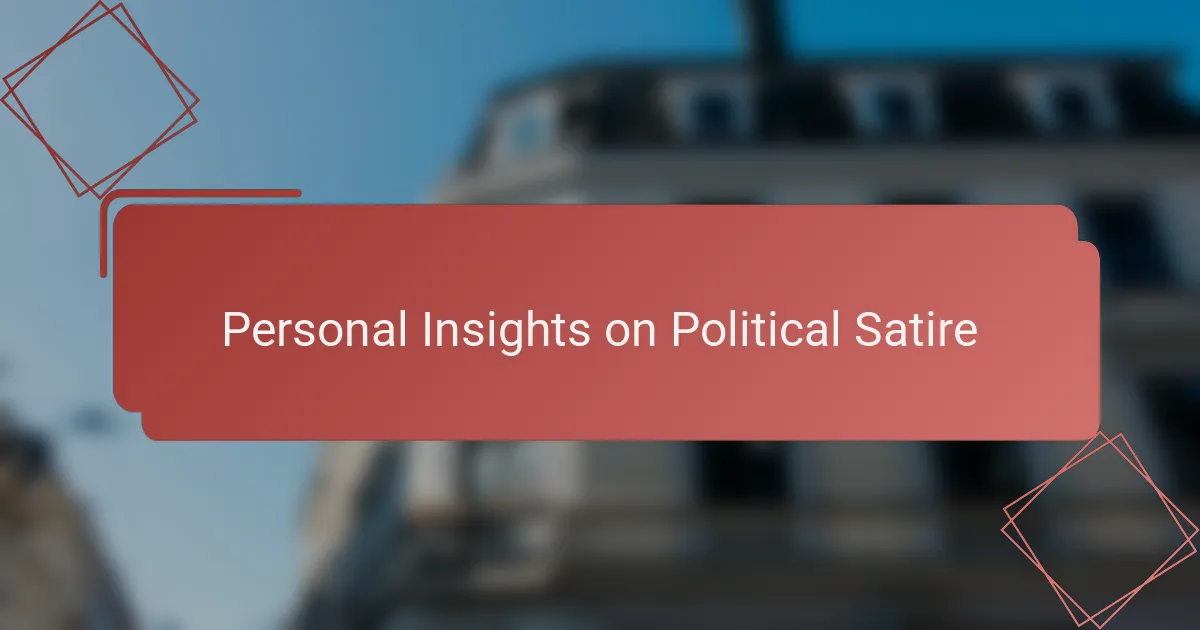
Personal Insights on Political Satire
Political satire, from my perspective, is a form of expression that’s deeply personal yet universally resonant. I’ve often found myself both laughing uproariously and feeling uncomfortable in the same moment—because good political satire cuts close to the bone. Have you ever experienced that mix of amusement and unease, realizing that the joke is pulling back a curtain on truths we’d rather ignore?
Sometimes, political satire feels like a conversation with a wise friend who isn’t afraid to challenge your beliefs. I remember encountering a satirical piece that flipped my understanding of a current event upside down, nudging me to question not just the politicians involved but my own assumptions as well. That’s the kind of insight I value most—it’s not just humor for humor’s sake but humor as a catalyst for thought.
I also think political satire thrives when it connects on an emotional level. When a joke resonates because it taps into shared frustrations or hopes, it creates a sense of community. Have you noticed how certain jokes linger long after the laughter fades, sticking in your mind and sometimes even motivating action? That’s the unique power political satire holds, turning humor into a subtle but potent form of engagement.
